- Home
- Iain Pears
The Dream of Scipio Page 3
The Dream of Scipio Read online
Page 3
There was not such a wide range of books available; some Aristotle, in a Latin translation of an Arabic version of the Greek; the church fathers; Boethius, whom he loved for his wisdom; Augustine, whom he admired for his humanity. But it was the day he discovered Cicero that changed everything. The beauty of the prose, the noble elegance of the ideas, the lofty majesty of the conceptions were like draughts of strong wine, and when he first discovered, then read, the one manuscript Ceccani possessed, he wept with joy for a full twenty minutes before immediately starting again.
Some six months later, he began his new career as a collector when he was in a shop to buy some sweetmeats for the household. This was not his task; rather it was something he often asked to be allowed to do, as the errand gave him the opportunity of leaving the dark, forboding palace where he now had quarters in the garret, and wander the streets of Avignon at will. Every time he went out he was transfixed by wonder, overwhelmed by the bustle of humanity, the noise, the smells, the excitement. For Avignon had transformed itself in a matter of a few years from a minor city into one of the wonders of the world. The arrival of the papal court, forced to leave Rome by civil strife and now showing every sign of staying forever, had sucked in merchants and bankers, priests and painters, goldsmiths, petitioners, lawyers, cooks, costume makers, furniture makers and masons, woodworkers and silversmiths, robbers and whores and charlatans who came from all over Christendom to jostle in the streets and compete for favor, influence, and fortune.
The city was not big enough for them all; it was bursting at the seams and men had to put up with being squashed, exploited, and robbed, but few found they were unprepared to pay the price. Bees around a honey pot, flies around dung; those were the common verdicts. Olivier had no opinion on the morality of it; all he knew was that a simple walk in the morning during the market, in the afternoon when the big religious processions took place, or in the evening when the city was taken over by drinkers and diners, singing and dancing, left his mind dizzy with excitement and all his senses tingling with joy.
And there were buildings as well; hundreds of houses, churches, palaces all being thrown up as quickly as possible, new land being leveled, old dwellings razed to make space for bigger ones. The first time he went into the papal palace he could not believe his eyes; he felt sure he was walking into an immense cave in a mountain; no man, surely, could dream of a building so vast. And yet even that was not big enough; the new pope, Clement, had deemed it all too small and was beginning again, doubling the size of the original, with decorations so sumptuous and so costly they would have no equal in the world. Sometimes, late at night when he lay on his bed wondering at all he had seen and smelled that day, Olivier could hardly stop himself laughing at the thought of his little Vaison, its few hundred inhabitants tucked up on a hill, which, until he came to Avignon, had seemed so grand.
The shop he went to was his favorite; shelves groaned with all manner of delicacies, some still hot and steaming from the oven, some cool and flaky with fresh pastry, stuffed with spices he had never heard of, and sold at prices that made him incredulous. He picked up what he had been told to collect, and as there was a risk his fingers might make dents in them, the shopkeeper took some pieces of paper to wrap them more firmly.
There was writing on them. Olivier read it and gasped; there was no possibility of mistaking that limpid, fluent voice that, once truly heard, could never be forgotten. In his excitement and eagerness to unwrap the paper, he let all the expensive foods drop to the floor, where they broke into crumbly pieces. He scarcely even noticed, although the shopkeeper was shocked.
“You’ll get a beating for that,” he began.
Olivier ignored him and waved the piece of paper in his face instead. “Where did you get this?”
His reddened, earnest, young face had such a look of intensity that the shopkeeper forgot his anger. “There’s a little pile. I found them on a rubbish heap outside the church of Saint-Jean,” he said.
“Give me them. I’ll buy them.”
A shake of the head. “That’s the last one, young man. I’ve been using them for days.”
The realization made Olivier almost choke, but he retained enough self-possession to get the names of the last dozen or so customers the shopkeeper had served. Then he spent the rest of the day trailing around the town, knocking on kitchen doors, suffering cuffs to the ears and insults, and the occasional pinch on the cheek in his quest. When he got back home in the evening—having spent an entire day in truancy—he was, as the shopkeeper had predicted, soundly beaten.
But it was well worth it, for carefully tucked away in his tunic he had most of a letter by Cicero, now known to be one of the letters to Atticus.
By the time his father came and paid a visit two months later, he had read his discovery so often he knew it by heart. Still, merely touching it—for he mistakenly thought it must be original and written down by Cicero himself, so little learning did he have at this stage—gave him the greatest possible pleasure. He even slept with it by his side at night. Nor could he comprehend that anyone would not be as excited as he; so, when he presented himself to his father and was asked to account for the past six months, he pulled the sheets of old paper out of his tunic to show them off.
As his story continued his father’s countenance darkened. “And you have spent your time on this, to the neglect of your studies?”
Olivier hastened to tell him that he had studied hard and well, omitting that he detested the work and did it out of duty alone.
“But you could have studied harder, spent more time with your proper duties, had you not wasted so much energy on this.”
Olivier hung his head. “But Cicero was a lawyer, sir . . .” he began. His father was not impressed.
“Do not try and trick me. That is not why you read this. Give it to me.”
He held out his hand, and Olivier, after a moment’s hesitation that his father noted all too well, gave the precious manuscript into his hands. Already he felt the tears welling up in his eyes.
His father stood up. “I will overlook your disobedience, but I must teach you a lesson. You must resist such foolishness. Your job is to become a lawyer, and fulfill all the hopes I have of you. Do you understand me?”
Olivier nodded mutely.
“Good. So you will see the wisdom of what I do now.” And his father turned around and put the manuscript onto the fire, standing back to watch it burst into bright flames, then turn black as it curled up and disintegrated.
Olivier was shaking so much, concentrating so hard on making sure that no tears fell down his cheeks, that he didn’t even flinch when his father gave him a friendly tap on the shoulder and delivered another homily about his obligations. He even managed to bid him farewell in a dignified fashion, received his blessing with humility, before rushing back to his home, climbing the stairs to the little attic room he shared with six others, and bawling his eyes out.
He had learned his lesson, although not the one his father hoped to inculcate. From that moment Olivier de Noyen determined that never would he become a lawyer.
Barneuve himself was not touched by the gods in this way, but merely studied those who were. The world needs only a few geniuses; civilization is maintained and extended by those lesser souls who corral the men of greatness, tie them down with explanations and footnotes and annotated editions, explain what they meant when they didn’t know themselves, show their true place in the awesome progression of mankind.
For this task he was perfectly trained, and had been so for twenty years or more, decades of work that he had spent patiently and meticulously accumulating the resources required for his chosen task. His, too, was a labor of passion and of love, for he was no pedant, no dry scholar cut off from the world. Far from it; he considered himself in a small way a crusader for the true values of civilization, burning with the love of life and of learning in an age that valued neither.
In his youth he had attempted some poetry, but was too st
ern a critic of others to fool himself. He was happy to abandon any such pretensions, and prided himself on a maturity that enabled him to stop wasting time while others of his generation frittered away their hours in artistic dreams. Or died; for Julien was fifteen when German troops swept across Belgium and into northern France; twenty when the carnage that all but eliminated an entire generation came to its end. It was not the time for romantic verse, or psychologically acute expressions of decadence. He rarely talked about this period of his life; he had no wish to revive memories of events that had so shaken him. He had volunteered early, rather than waiting to be conscripted, for he felt a duty and an obligation to serve, and believed that not only fighting, but also being willing to fight for his country and the liberty it represented, would make some small difference. He was injured twice, decorated twice, and took part in the terrible conflict around Verdun; that in itself is enough to indicate something of what he endured. His idealism was one of the casualties of the carnage.
Millions died; Barneuve survived. When he was finally discharged in early 1918—his injuries rendering him unfit for further military service—he came home to the house in Vaison, a solid house of substance in what is now the rue Jean Jaurès, and resumed his former life. His father never discussed the experience, and Julien felt no desire to mention it either; he might have done so had his mother still been alive. The only slight hint of his feelings was that, one morning, just after the armistice, he was to be seen in the garden slowly taking the decorations and campaign medals he had been awarded and throwing them all on a bonfire. They had been earned by someone he no longer knew, indeed by someone he considered already dead, full of dreams and aspirations he could scarcely understand. From then on, Julien conceived of his duty in a different fashion. The medals themselves were hardly damaged by the heat, but they were dirtied and covered in ash, so much so that later the gardener unknowingly dug them into the ground where, presumably, they still remain. As for his father, Docteur Barneuve threw himself into organizing the public subscription for the huge monument to the dead that was cut into the mountain supporting the old town; it was the closest he ever came to telling his son of his relief that his name was not also inscribed on its panels, that he was not the dying soldier carved so vividly onto its white marble.
Three months to the day after he came home—a period mainly spent sitting in the garden of his maternal grandmother’s house at Roaix a few kilometers to the west, for after a short while he found living in his family home irksome—Julien got up at five in the morning, took down the books he had been reading the day he left for the army, and began once more, picking up at exactly the page where he had inserted his bookmark three years previously. He worked silently, efficiently, and hard, showing the powers of concentration that he had always been able to summon. After he had drunk a coffee with a piece of bread from the previous day dipped in it, he sat and read and annotated until twelve, when he would put on a hat and walk into the village and eat some soup at the café. Then he worked again until six, ate, then worked again until midnight. This pattern of study he kept up, year after year, until he was ready: he sat, and passed with ease, the agrégation in history and geography, an intellectual marathon and obstacle race that, until it was reformed in 1941, was perhaps the most fiendishly demanding examination the mind of man has ever devised.
It says much of Barneuve’s character, and of his intellect, that he emerged near the head of his year. His career in a sense was already made; he had now merely to collect the fruits of his labors. After doing his time in a provincial lycée in Rennes, sent there by the French state to teach him humility, he could reasonably look forward to spending the rest of his working life in Paris. A model academic career was already laid out, one of steady accomplishment, a continual drip of honors and rewards, and the quiet respect of colleagues and pupils. He was, by this stage, already working on his thèse, a vast work on late Neoplatonism in the West, which took him much of the next two decades to complete.
It was not to be so perfectly smooth, nor so easy; he had embraced self-satisfied complacency too young. The simple life of predictable, safe accomplishment was not, it seemed, what he truly craved. For in 1924 he won a greatly sought-after scholarship to spend two years at the École de Rome, and as a preliminary took a cruise around the Mediterranean to celebrate, paid for by his father. On it he reacquainted himself with Olivier de Noyen, and he, in turn, eventually introduced him to Manlius Hippomanes.
Père Sautel has only an incidental role in this story; he is, in some ways, no more important than the plague bacillus that ultimately killed much of Olivier de Noyen’s generation; an agent acting unknowingly for his own reasons and unaware of any of the consequences. But the effect he had on the young Julien was of such magnitude that he deserves to be considered, lest his brief intersection with him be misunderstood as either trivial or coincidental. There was, in fact, an inevitability about their encounter; it had been likely since Julien’s parents married in 1892, his wife contributing to the family the peaceful little house in Roaix, which she adored so much that she went there every summer to avoid the oppressive heat of the town. It became probable when the youthful Sautel developed a passion for archaeology and won permission from his bishop to indulge it. It became certain when Julien, to escape the solicitudes of his mother, took to long walks during the otherwise empty afternoons when he was alone with her during the summer months.
He was ten in that summer, the age when children are the most impressionable, and Sautel was an impressive man. They met late in the afternoon, when the boy was tired and thirsty. He had gone a long way, along lanes and tracks, crossing the nearly dried-up Ouvèze, then walking in the direction of the bois de Darbaux on the other side toward the hills that rose from the river valley, dark and threateningly against the brilliant blue sky. Then he got lost, and turned back, cutting across fields to save time while also thinking of his anxious mother—who had told him not to go for more than half an hour—to give form to his mounting panic.
The freshly dug mounds of earth, dark in parts, sandy in others, mottled where the sun had partially dried them, attracted his attention first of all, and made him hope that there were some workmen in the field beyond, perhaps building a barn. He clambered through the ditch, scratching his leg on the brambles as he climbed up, then walked past the huge earthworks to see what he could find.
There was no one there, or no one he could see. Signs of recent activity were all around—wheelbarrows, picks and shovels, black circles of ash where trees had been cut and burned. But no people, just the swallows wheeling in the air. Julien stood uncertainly, then walked to what looked like a ruined building in the hope that someone was about.
There he entered a world of magic. The walls were only a few feet high, of rough stone and pebbles and crumbling mortar, nothing to look at, but as he walked past one, then another, he saw a sight that made him catch his breath. Before him, laid out on the floor, was an enormous, beautiful bird, picked out in tiny stones, its blues and golds and reds glittering as the fierce afternoon sun reflected off the water that had been used to clean it. Almost as though it was alive. Better than if it had been alive; no real bird could ever attract the eye like that, or nestle so beautifully in the stone foliage as this one did.
Utterly transfixed with wonder, and scarcely daring to breathe lest it hear him and fly away, he took a step closer, then bent down to run his hands over the irregular, almost sharp surface.
“Get off!” An angry, urgent voice broke the peace and the spell. The bird did not move. Julien stood up sharply and looked around him.
“I said get off, you little wretch! Hurry. Do as you’re told.”
Julien took a step backward, caught his foot on a loose boulder, and fell heavily, sprawling over the pavement.
“Dear heaven! Stay there. Don’t move.”
Then the owner of the exasperated voice appeared from behind one of the walls. A big man, only in his twenties but seeming much o
lder to Julien, with a bushy beard and wearing a white shirt and loose, baggy trousers. In his hand he carried a notebook, which he put carefully on top of the wall before stepping over the bird to help Julien up.
“Are you all right? You didn’t hurt yourself?”
Julien said he hadn’t. The man smelled of sweat. A nice, comforting smell, Julien thought.
“Can’t you read? Didn’t you see the sign on the road? ‘Private. Keep out.’ I suppose that just made you even nosier.”
“I’m sorry, sir,” Julien said timidly. “I didn’t come by the road. I came across the fields. I’m lost and my mother will be worrying about me. I hoped someone could tell me where I was.”
The big man studied his face carefully, saw no signs of impudence or deceit, then grunted. “Very well. I’ll take you to the road and show you.”
“No!” Julien cried desperately, though he didn’t know why he was suddenly so afraid. The man raised an eyebrow.
“I’m sorry,” Julien continued. “But please tell me, what is this place? I must know. Why’s that bird there?”
“Do you like it?”
“It’s beautiful,” Julien said reverently. “The most beautiful thing I’ve ever seen.”
The man smiled. “Yes,” he said gently. “I might well agree with you.”
And he told Julien that it was a mosaic, which had lain unseen for many hundreds of years, until he had come along and uncovered it. Then as the boy evidently hung on his every word, he led him through the rooms of Manlius’s villa, pointing out what he knew, or could guess, about each one, showing him the fragments of broken statues his workmen had discovered, the few roof tiles that had fallen to the floor when the timbers gave out, the remains of the colonnade by the great entranceway, gap-toothed with four of its columns completely vanished.

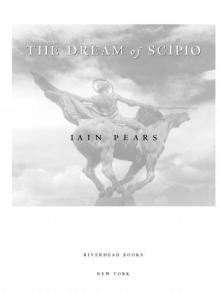 The Dream of Scipio
The Dream of Scipio Stone's Fall
Stone's Fall The Last Judgement
The Last Judgement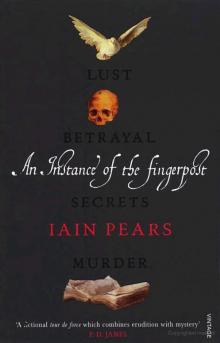 An Instance of the Fingerpost
An Instance of the Fingerpost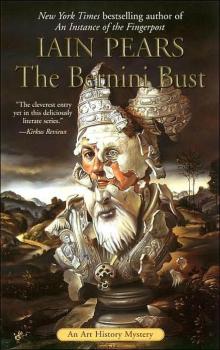 The Bernini Bust
The Bernini Bust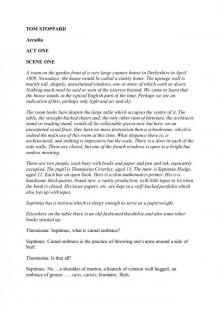 Arcadia
Arcadia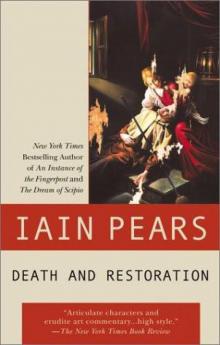 Death and Restoration
Death and Restoration The Raphael Affair
The Raphael Affair The Titian Committee
The Titian Committee The Immaculate Deception
The Immaculate Deception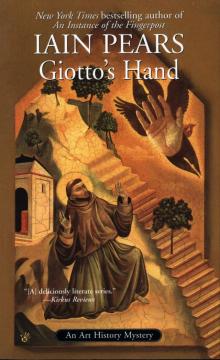 Giotto's hand
Giotto's hand The Portrait
The Portrait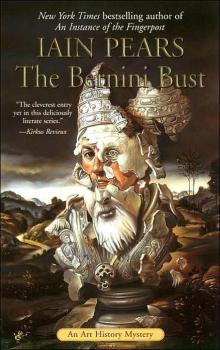 The Bernini Bust ja-3
The Bernini Bust ja-3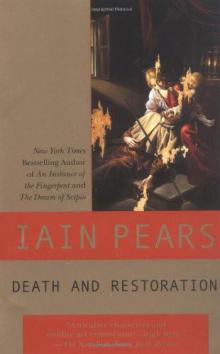 Death & Restoration ja-6
Death & Restoration ja-6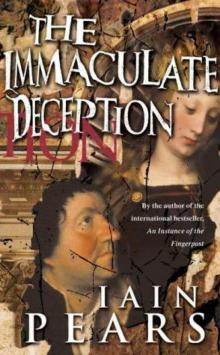 The Immaculate Deception ja-7
The Immaculate Deception ja-7